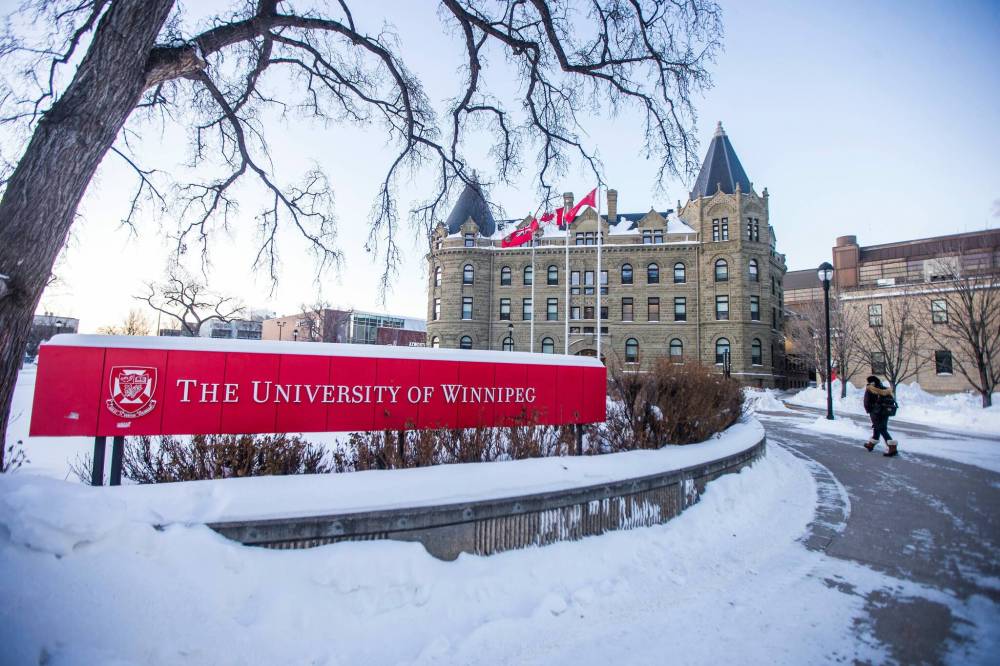Province takes step back from proposed post-secondary funding formula
Advertisement
Read this article for free:
or
Already have an account? Log in here »
To continue reading, please subscribe:
Monthly Digital Subscription
$0 for the first 4 weeks*
- Enjoy unlimited reading on winnipegfreepress.com
- Read the E-Edition, our digital replica newspaper
- Access News Break, our award-winning app
- Play interactive puzzles
*No charge for 4 weeks then price increases to the regular rate of $19.00 plus GST every four weeks. Offer available to new and qualified returning subscribers only. Cancel any time.
Monthly Digital Subscription
$4.75/week*
- Enjoy unlimited reading on winnipegfreepress.com
- Read the E-Edition, our digital replica newspaper
- Access News Break, our award-winning app
- Play interactive puzzles
*Billed as $19 plus GST every four weeks. Cancel any time.
To continue reading, please subscribe:
Add Free Press access to your Brandon Sun subscription for only an additional
$1 for the first 4 weeks*
*Your next subscription payment will increase by $1.00 and you will be charged $16.99 plus GST for four weeks. After four weeks, your payment will increase to $23.99 plus GST every four weeks.
Read unlimited articles for free today:
or
Already have an account? Log in here »
Hey there, time traveller!
This article was published 15/11/2022 (1118 days ago), so information in it may no longer be current.
The provincial government is pausing plans to roll out a controversial new funding formula for universities and colleges that would require metrics — for instance, specific graduation rates and other achievement benchmarks — be met in exchange for dollars.
Manitoba has long-funded post-secondary institutes with annual block grants. In recent years, however, the Progressive Conservatives have set their sights on Tennessee’s performance-based funding model.
The proposed formula, which is popular across the United States, has been met with widespread criticism from local school leaders, faculty associations and student groups.

Manitoba has long-funded post-secondary institutes with annual block grants, but recently, the Progressive Conservatives have set their sights on a performance-based funding model. (Mikaela MacKenzie / Winnipeg Free Press files)
“We need to take a bit of a step back, look at those institutions and say: ‘What is going to keep them going right now?’” Premier Heather Stefanson told reporters Tuesday, following the release of a throne speech that made no mention of metric-based funding.
“I’m always in favour of performance measures, but I think, through COVID, as we’ve come through COVID, there’s been some challenges (for schools).”
Advanced Education Minister Jon Reyes will continue to meet with stakeholders to figure out what is best for the sector and work towards tailoring programs to better meet labour market needs, according to the premier.
The throne speech touted collaboration between schools and businesses, addressed the growing importance of offering micro credentials, and indicated the province is “considering all post-secondary program proposals that will help address labour shortages and foster economic growth.”
It also states the government is taking a “close look” at ensuring equitable funding across institutions.
Since the spring, the advanced education department has been seeking feedback on the province’s so-called post-secondary accountability framework. The framework was born in response to a 2017 KPMG review and the auditor general’s 2020 report, both of which criticize the government’s limited oversight of post-secondary institutions.
The Manitoba Organization of Faculty Association has been one of the most vocal critics of the Tories’ plan to reform how it pays for higher education, citing existing accountability mechanisms that academics claim are underutilized by the province.
Among its examples, the association’s leaders have repeatedly cited the province’s powers to appoint the majority of the board of governors — the body that oversees school finances — at the University of Manitoba.
“I think it’s become clear, as people have learned more about the Tennessee model, that it’s not a good choice,” said Michael Shaw, a senior instructor of biology at the U of M who is a member of the MOFA executive.
“All it is is a disguise so that governments who want to reduce their funding have an excuse and mechanism to do so.”
Shaw indicated there is oversight built into boards of governors, transfers between institutions and the province, and frequent correspondence between the partners. He expressed relief after the premier confirmed plans to “step back” from a radical funding formula change Tuesday.
“For now, students will be very relieved to hear about (Stefanson’s remarks), but I’m not going to say completely happy because stepping back doesn’t mean we are cancelling something. Stepping back means we are pausing, we are trying to think, we are trying to discuss,” said Marie Paule Ehoussou, chairwoman of the Canadian Federation of Students chapter in Manitoba.
Ehoussou said student groups are united in their opposition to performance-based funding because the model could allow the province to favour certain higher-education programs over others based on employment outcomes and as a result, arts and humanities programming may suffer.
Before it was dissolved in 2015, the Council on Post-Secondary Education oversaw post-secondary operations as an arm’s length agency of the government. The now-defunct council compiled student demographics, funding sources and other university and college statistics in its annual reports.
— with files from Carol Sanders and Danielle Da Silva
maggie.macintosh@freepress.mb.ca
Twitter: @macintoshmaggie

Maggie Macintosh reports on education for the Winnipeg Free Press. Funding for the Free Press education reporter comes from the Government of Canada through the Local Journalism Initiative.
Our newsroom depends on a growing audience of readers to power our journalism. If you are not a paid reader, please consider becoming a subscriber.
Our newsroom depends on its audience of readers to power our journalism. Thank you for your support.


